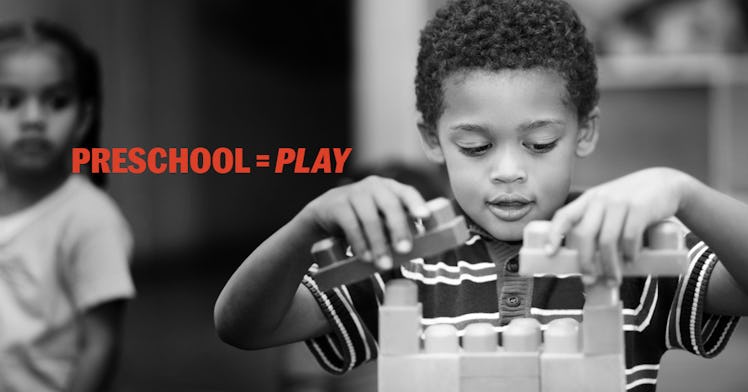Preschool Academics Don’t Help Children Succeed. Playing Does.
Parents are feeling the pressure give their kids early education in reading, science, and math, but the real benefits to their future might come from unstructured preschool play.

Every parent wants a successful kid. And many moms and dads believe success comes easier if their kids can read and do math as early as possible. So, in order to meet demands for intellectual rigor, preschools and “high quality” early-learning centers market themselves as educational crucibles. These schools assure parents their toddlers will be given the skills to summit the grade school grading curve. But, their curricula leave little room for kids to do what they are designed to do: play. And according to the American Academy of Pediatrics the push for educational excellence is not only incredibly misguided, it’s completely antithetical to the way children should develop. Kids don’t need math drills; they need to run, fall, wrestle, get messy, and, above all, have a damn good time.
On the surface, it seems completely logical that if a kid is being drilled on math and language when they’re four, they’ll be more capable when they’re in Kindergarten. And if they’re super successful in Kindergarten, then they should be super successful down the line. But this logic runs counter to biology according to the just-released AAP clinical report The Power of Play: A Pediatric Role in Enhancing Development in Young Children. The problem? Drills are about memorizing content whereas play is about developing the processes that are essential to learning.
“The benefits of play are extensive and well documented,” the authors — doctors all — write. “And include improvements in executive functioning, language, early math skills (numerosity and spatial concepts), social development, peer relations, physical development and health, and enhanced sense of agency.”
When children are given the agency to play freely, they essentially act as scientists. Play, at its core, is experimentation. When a ball is thrown a kid is learning about physics and spatial relations. When the ball hits another child and that child cries, they are learning about peer relations. When a teacher speaks to the ball-thrower about apologizing, the child is learning about communication and empathy. Can any of this be put in a lesson plan for parents with a distinct set of educational benchmarks? Not really. But that doesn’t make the experience any less valuable.
So how does this work? Well, first we have to understand that humans are physical creatures. Like any other animal on this planet, our brain development is tied to experience. Our heads are not simply blank hard drives waiting to be filled. Our brain changes based on the way we interact with our environment. Consider a study referenced in the report which found, “When playing with objects under minimal adult direction, preschool children named an average of 3 times as many nonstandard uses for an object compared with children who were given specific instructions.”
Another study involving older children found that when 7- to 9-year-olds engaged in physical play they had “enhanced attentional inhibition, cognitive flexibility, and brain functioning that were indicative of enhanced executive control.”
And sure, it’s worth asking if any of that means a kid will be successful later in life. Well, in fact, it sure looks like it. Because what play does is enhance a child’s creativity, their ability to problem solve, collaborate and communicate with others and regulate their emotions. These qualities will ultimately help a child learn the important science, math, engineering, and technology skills parents are told that children need. More than that, play helps children develop their brains prefrontal cortex, crucial to executive functioning skills that help them regulate emotion and stress.
Sadly, parents have been sold a pernicious lie that a didactic, strict and thorough early education is the key to success. Freewheeling fun, we are told, is frivolous. The only fun that is beneficial is when it’s connected to a thoroughly tested curriculum. But what that kind of education creates is children who don’t ask questions and submit to authority. At one time in our history, that kind of individual would have been the ideal employee. But our future will be built by humans who can think creatively, communicate effectively and innovate.
Playing is crucial to learning. And in fact, the best preschools are not the ones stocked with iPads and shiny binders full of handouts. The best preschools are those that are noisy and chaotic, filled to the brim with blocks and costumes and art supplies. Even better, the best preschool may be no preschool at all, but a simple scrum of kids wheeling across a playground.
The AAP report authors are unequivocal on this point. “Instead of focusing solely on academic skills, such as reciting the alphabet, early literacy, using flash cards, engaging with computer toys, and teaching to tests (which has been overemphasized to promote improved test results),” they argue. “Cultivating the joy of learning through play is likely to better encourage long-term academic success.”
In the end, it turns out that Pink Floyd may have had it right after all. “Hey, teacher, leave them kids alone.”